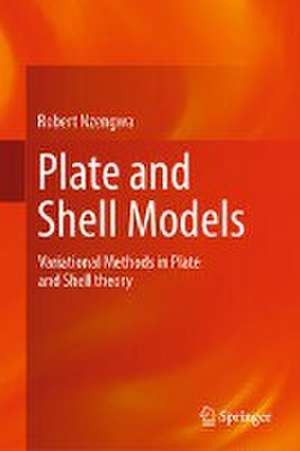Plate and Shell Models
Autor Robert Nzengwaen Limba Engleză Paperback – 20 oct 2023
Preț: 383.17 lei
Nou
Puncte Express: 575
Preț estimativ în valută:
73.33€ • 75.75$ • 61.03£
73.33€ • 75.75$ • 61.03£
Carte nepublicată încă
Doresc să fiu notificat când acest titlu va fi disponibil:
Se trimite...
Preluare comenzi: 021 569.72.76
Specificații
Notă biografică
Prof. Nzengawa has been teaching in masters level, for many years now, in engineering advance schools such as The Ecole Nationale Supérieure Polytechnique de Yaoundé where he was the head of the department of civil engineering, The Ecole Nationale Supérieure Polytechnique de Douala, former Faculty of Industrial Engineering, where he was the Dean and the head of the department of construction engineering. These results are also used in the engineering office that he runs.
Cuprins
Dedication List of Figures
List of Tables
Acknowledgements
1 CURVILINEAR MEDIA
1.1 GEOMETRY OF A 3D CURVILINEAR MEDIA
1.2 SURFACE GEOMETRY
2 EQUILIBRIUM EQUATIONS
2.1 GEOMETRY OF A SHELL
2.2 EULER'S EQUATIONS AND VARIATIONAL FORMULATION
3 DYNAMIC EVOLUTION OF SHELLS
3.1 DYNAMIC EQUILIBRIUM EQUATION OF THE N-T MODEL . . . . . .
3.2 FREE VIBRATIONS 3.3 THE MODEL "N" OF THICK SHELLS. . . . . . . . . . . . . . . . .
4 THIN SHELLS
4.1 THEORY OF THIN SHELLS
4.2 THE MEMBRANE THEORY OF THIN SHELLS. . . . . . . . . . .
.4.3 THE MIXED THEORY (MEMBRANE-BENDING) OF THIN SHELLS
4.4 THEORY OF PLATES 4.5 THEORY OF ORTHOTROPIC PLATES
5 NUMERICAL METHODS
5.1 GENERALITIES OF THE 2D FEM. . . . . . . . . . . . . . . . . . .
5.2 C0 FINITE ELEMENTS. . . . . . . . . . . . . . . . . . . . . . . . . .
5.3 CURVED TRIANGULAR ELEMENTS AND ASSUMED STRAIN APPROACH FOR SHELLS. . . . . . . . . . . . . . . . . . . . . . . .
5.4 APPLICATIONS. . . . . . . . . . . . . . . . . . . . . . . . . . . . . .
6 OTHER MODELS
6.1 STIFFENED,THERMOELASTIC AND HOMOGENEOUS ANISOTROPIC SHELLS. . . . . . . . . . . . . . . . . . . . . . . . . . . . . . . . . . .
6.2 HETEROGENEOUS SHELLS. . . . . . . . . . . . . . . . . . . . .
6.3 SOME SEMI-ANALYTIC MODELS. . . . . . . . . . . . . . . . . .
6.4 COSSERAT THICK SHELLS. . . . . . . . . . . . . . . . . . . . . .
Bibliography
List of Tables
Acknowledgements
1 CURVILINEAR MEDIA
1.1 GEOMETRY OF A 3D CURVILINEAR MEDIA
1.2 SURFACE GEOMETRY
2 EQUILIBRIUM EQUATIONS
2.1 GEOMETRY OF A SHELL
2.2 EULER'S EQUATIONS AND VARIATIONAL FORMULATION
3 DYNAMIC EVOLUTION OF SHELLS
3.1 DYNAMIC EQUILIBRIUM EQUATION OF THE N-T MODEL . . . . . .
3.2 FREE VIBRATIONS 3.3 THE MODEL "N" OF THICK SHELLS. . . . . . . . . . . . . . . . .
4 THIN SHELLS
4.1 THEORY OF THIN SHELLS
4.2 THE MEMBRANE THEORY OF THIN SHELLS. . . . . . . . . . .
.4.3 THE MIXED THEORY (MEMBRANE-BENDING) OF THIN SHELLS
4.4 THEORY OF PLATES 4.5 THEORY OF ORTHOTROPIC PLATES
5 NUMERICAL METHODS
5.1 GENERALITIES OF THE 2D FEM. . . . . . . . . . . . . . . . . . .
5.2 C0 FINITE ELEMENTS. . . . . . . . . . . . . . . . . . . . . . . . . .
5.3 CURVED TRIANGULAR ELEMENTS AND ASSUMED STRAIN APPROACH FOR SHELLS. . . . . . . . . . . . . . . . . . . . . . . .
5.4 APPLICATIONS. . . . . . . . . . . . . . . . . . . . . . . . . . . . . .
6 OTHER MODELS
6.1 STIFFENED,THERMOELASTIC AND HOMOGENEOUS ANISOTROPIC SHELLS. . . . . . . . . . . . . . . . . . . . . . . . . . . . . . . . . . .
6.2 HETEROGENEOUS SHELLS. . . . . . . . . . . . . . . . . . . . .
6.3 SOME SEMI-ANALYTIC MODELS. . . . . . . . . . . . . . . . . .
6.4 COSSERAT THICK SHELLS. . . . . . . . . . . . . . . . . . . . . .
Bibliography
Textul de pe ultima copertă
This book presents, in a variational form, very many two dimensional models which have been developed to overcome some weaknesses of the Kirchhoff-Love and Reissner-Mindlin’s models. More precisely the N-T and N models are particularly treated because they clearly show the impact of the change in the third fundamental form whose contribution to the strain energy becomes important when the characteristic ratio of the shell is roughly greater than 0.3. Transverse stresses through-the-thickness are calculated. Gradient Recovery and Strain deformation approach with Curve triangular and Shifted Lagrange elements are implemented. These new FEM appear to be memory less greedy.
Caracteristici
Presents the different models in a variational form suitable to implement FEM Covers Gradient Recovery and Strain Deformation methods Defines governing equations on transverse stresses through the thickness
